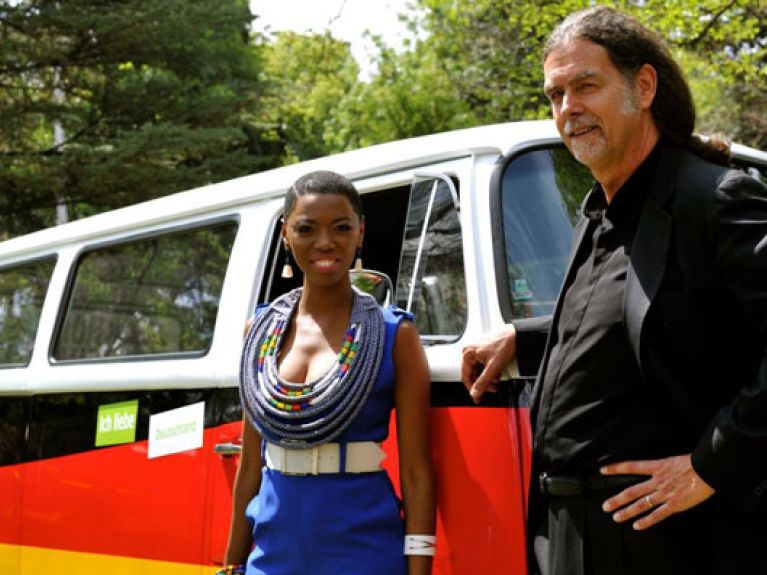Ambassador Walter Lindner in South Africa
In the deutschland.de-series “Foreign posting”, ambassadors and high-ranking German staff in international organizations give insights into their work. Part 24: Walter Lindner in South Africa.

How has the role of ambassador changed in recent years?
Diplomats don’t have an easy time leaving an impression of being casual and approachable. They are surrounded by an aura of the unapproachable, aloof, important; at any rate not the sort of people who are familiar with the everyday cares of the man in the street. Closeness to normal life doesn’t come by itself; you have to seek it. Curiosity, spontaneity, improvisation and love of adventure are good guides here. Remaining shut up in diplomatic circles, reciting standard speeches, clichéd formulations that say everything and nothing aren’t good guides. What many “normal” people miss in diplomats is approachability, humour, the capacity to listen and authenticity. I’m glad that the public’s expectations of the representative of a country have now changed. Conventions, cocktails, protocol and endless disputes about commas behind closed doors are no longer enough in the age of social media. Today the focus is much more on conveying fellow-feeling, openness, public relations, direct discussion with citizens and innovative approaches. A happy change!
You are said to be a somewhat “different sort of diplomat”. How should South Africa remember you?
At all my postings – Kenya, Venezuela, South Africa – I’ve been sooner or later overtaken by the reputation of being the cool ambassador, who in any case doesn’t fit into the traditional role of the diplomat. That is on the one hand normal for a trained musician with long hair and a ponytail, and on the other hand probably has to do above all with the previously described new image of an ambassador: rather out there in the townships and in discussion with students or unemployed young people than spending his time at repetitive cocktail parties. Rather on stage with the jazz greats of the country than writing unread routine work destined for the shallows of ministerial archives. Rather the host at South African talk shows than “Your Excellency” wrapped in the cocoon of state protocol. Naturally, much depends on the surroundings and security of the respective country: in Kabul and Bagdad much isn’t possible that is an option in Africa and Latin America, for example. In South Africa many things are possible: music, humour, football, new communication, free speech, innovative approaches. I’ve been active on Twitter since my arrival here, and then too there are the Twitter channels and Facebook pages of the embassy and of the German Information Centre of Africa. With our project #KhombiSAGermany, we’ve now also started on Instagram. We’ve converted a 71er VW hippie bus into a Deutschlandmobile and travel with it where embassies don’t usually go: the ambassador as taxi driver through the townships of Mamelodi und Soweto.
Why are Germany and South Africa important to one another?
South Africa is our strategic partner on the African continent. The levels of exchange are numerous and various: over 600 German businesses are active here and create about 100,000 jobs on the ground. Every year hundreds of thousands of German tourists come to the country, many of them not for the first time. The exchange is also strong at the political level: in November 2016 the Binational Commission will meet and eight expert committees will agree upon specific cooperation projects. The topics range from science and renewable energies to foreign policy and security policy.
It’s said you have a particular passion for Africa and you’ve already lived for more than ten years on the continent. What fascinates you about Africa, what do you think is its attraction?
There are many aspects. Let me highlight a few. As a trained professional musician (for connoisseurs: also a lawyer), who stands on stage with local and regional music greats, you have a completely different access to the population and to young people in particular – music is nowhere so lived as in Africa. It’s in music that the true soul of the continent and its people opens itself. For decades I’ve worked in my own recording studio, which accompanies wherever I go. There’s been a steady stream of co-productions with guest musicians from the respective countries – Eric Wainaina in Kenya, salsa greats in Caracas and jazz legend Sipho Hotstix in South Africa. In almost every corner of the earth you meet fantastic talents – especially many, by the way, here in South Africa. If I’d stayed only a lawyer, these perspectives would have remained closed to me.
The inside and the outside view of a country often differ. What, on the basis of your personal experience, should be said about South Africa?
In the German perception the problems of the country are too strongly emphasized. Sure, the poverty and criminality can’t be denied and you have to stick to certain ruled here. On the other hand, in South Africa you find the whole world in one country. The variety of landscape and culture is immense. From tropics to mountains and deserts to dream beaches – you find everything here. The people are open, humorous and hospitable. Many people here who wouldn’t otherwise have work benefit from tourism. I promise you, you’ll like it here.
Facebook:
Twitter:
Instagram:

